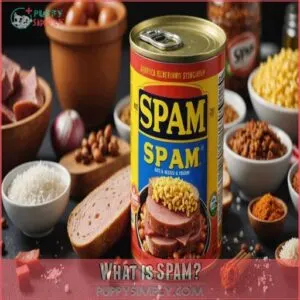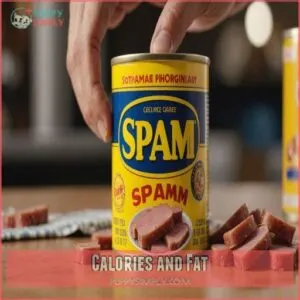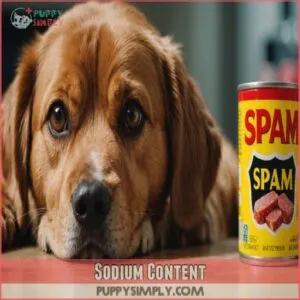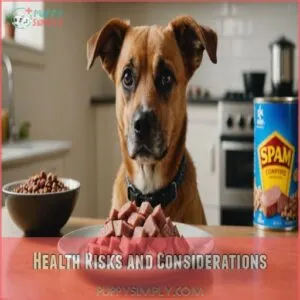This site is supported by our readers. We may earn a commission, at no cost to you, if you purchase through links.
 You might be tempted to share some Spam with your dog, but it’s not a good idea.
You might be tempted to share some Spam with your dog, but it’s not a good idea.
This processed meat is loaded with sodium and fat, which can lead to digestive issues like vomiting or diarrhea for your furry friend.
Too much sodium might even cause more serious problems, such as dehydration or pancreatitis.
Dogs thrive on diets rich in lean proteins and essential nutrients—not the mystery mix found in Spam.
While it might seem harmless, feeding Spam could be a slippery slope to health issues.
Instead, think of healthier dog-friendly options that’ll keep your pup wagging their tail!
Table Of Contents
- Key Takeaways
- What is SPAM?
- Nutritional Content of SPAM
- Can Dogs Eat SPAM?
- Why Dogs Shouldn’t Eat SPAM
- Canine Dietary Needs
- Alternatives to SPAM for Dogs
- Health Risks and Considerations
- Frequently Asked Questions (FAQs)
- What happens if my dog eats Spam?
- Can pets have Spam?
- What canned meat can dogs eat?
- What meat should dogs avoid?
- How does SPAM affect dog behavior?
- Is cooked SPAM safer for dogs?
- Can puppies have a small SPAM portion?
- What immediate actions if a dog eats SPAM?
- How does SPAM compare to other meats for dogs?
- Conclusion
Key Takeaways
- Spam’s high sodium content can cause serious health problems in dogs, including sodium poisoning.
- The high fat content in Spam contributes to weight gain, pancreatitis, and other digestive issues.
- Spam lacks essential nutrients dogs need for a balanced diet.
- You should avoid giving your dog any Spam and opt for healthier, dog-friendly alternatives instead.
What is SPAM?
SPAM is a canned meat product made from ground pork shoulder, water, and salt originally created in the 1930s.
It has become popular worldwide, thanks to its convenience and long shelf life.
But it’s important to remember its high sodium and fat content.
History of SPAM
Curious about SPAM’s past?
Born in the late 1930s, this canned meat became a wartime staple due to its long shelf life.
SPAM’s global popularity soared, supported by clever marketing campaigns, and it developed a cultural impact that’s hard to ignore, with numerous products available on websites like Dog Eat Spam Gear.
While humans embraced its convenience, feeding it to dogs isn’t wise, considering potential sodium poisoning.
Ingredients and Nutritional Content
What’s inside that can of SPAM? Besides its quirky history, it’s about sodium levels, fat content, and protein quality. You’ll find:
- High sodium: At 790 mg per serving, it’s a real sodium overload for both pets and people.
- Fat content: 16 grams per serving.
- Protein quality: Not suitable for dogs.
- Vitamins and minerals: Limited nutritional benefits.
Why SPAM Became a Popular Human Food
SPAM became popular during WWII because it was cheap, convenient, and easy to prepare, just like a superhero in a crowded pantry.
Clever marketing helped it become a household staple, and its taste appealed to those in rationing times.
While people embraced it, you might wonder "Can dogs eat SPAM?"
Sadly, due to its processed nature, it’s not ideal for them.
It’s worth noting that dogs have specific dietary needs, and even a seemingly harmless human food like turkey has its own set of safe Thanksgiving treats for dogs.
Nutritional Content of SPAM
Before we discuss whether your furry friend can enjoy some SPAM, let’s look at what’s actually in that iconic can.
You’ll find it’s surprisingly high in sodium and fat, which isn’t ideal for canine companions.
Calories and Fat
Regarding SPAM’s calories and fat content, each 2-ounce serving surprises with 180 calories and 16 grams of fat.
That’s enough to make your vet shake their head!
Too much fat can lead to weight gain and health issues in dogs.
It’s like letting your pup binge on junk food—best to play it safe with healthier options.
Sodium Content
Ever thought about the sodium content in SPAM?
It’s sky-high, with 790 milligrams per serving—a real no-no for your pup’s health.
Dogs munching on salty snacks like this could face serious sodium poisoning.
Watch out for symptoms like dehydration and kidney strain.
Remember, laughter’s the best medicine, but not when it comes to your furry friend’s diet!
Protein and Vitamins
After tackling sodium’s tale, note that SPAM does offer some protein and vitamins, but it’s a mixed bag for dogs.
Here’s why: If you’re looking for safer alternatives, consider products from websites that specialize in dog-safe versions, such as Dog Safe Spam products.
- Protein: SPAM contains 7 grams per serving, not ideal for dogs.
- Vitamins: Minimal benefits, missing key components.
- Better Options: Look for protein sources like chicken, add veg, and consider canine nutritional supplements for a balanced meal.
Can Dogs Eat SPAM?
You might wonder if your dog can share a little bit of your SPAM sandwich, but it’s not the best idea.
The high sodium and fat content in SPAM can cause health issues for dogs, making it more of a risky treat than a savory snack.
Potential Health Risks of SPAM for Dogs
SPAM might seem like a tasty treat for dogs, but it’s a recipe for trouble.
With its high sodium levels and fat content, a nibble can lead to sodium poisoning, kidney problems, or even pancreatitis.
Opt for high-quality dog food or healthy human foods for dogs instead to keep your furry friend safe and sound.
Here’s a quick breakdown:
| Risk | Consequence |
|---|---|
| Sodium poisoning | Increased thirst |
| Kidney problems | Strain on kidneys |
| Pancreatitis risk | Digestive upset |
| Weight gain | Obesity |
Veterinarian Opinions on Dogs and SPAM
Many vets agree, giving SPAM to dogs isn’t the best idea.
Similar risks are associated with feeding dogs high-fat foods like McDonald’s French Fries, which can trigger pancreatitis. The high sodium and fat content pose risks to dog health, such as pancreatitis and obesity.
They suggest focusing on safe alternatives, like avoiding hot dogs due to their high fat and calorie content linked to obesity and diabetes risks, and adopting healthy feeding habits.
Always prioritize veterinary care and seek dog care tips that guarantee your pet’s wellness.
Your pup deserves only the best, right?
Why Dogs Shouldn’t Eat SPAM
You might think SPAM is a tasty treat, but it’s packed with salt and fat that aren’t good for your furry friend’s health, potentially causing digestive upset or even more serious problems.
Let’s explore why skipping the SPAM is best for your dog’s well-being.
High Sodium Levels
Salt is sneaky, isn’t it?
SPAM’s high sodium content can lead to salt poisoning, making your pup feel sick as a dog.
This excessive sodium is especially problematic given the significant sodium levels in one serving of Spam.
Excess sodium strains their kidneys and heart, risking long-term health issues.
Even with extra water consumption, it’s hard to balance.
Stick to low-sodium dog treats and healthy fats for dogs, ensuring they stay wagging and healthy.
High Fat Content
After worrying about sodium’s toll, it’s wise to chew over fat’s impact on your furry friend.
The high fat content in SPAM may invite trouble like pancreatitis or packing on pounds.
Consider these options:
- Opt for healthy fat sources like chicken or fish.
- Make homemade dog treats using lean meats.
- Balance meals with dog-specific calming treats or CBD for dogs.
Lack of Essential Nutrients
SPAM’s high fat content isn’t the only concern.
It also lacks essential nutrients, which are important for your dog’s health.
You can find a variety of dog-specific SPAM products on this website, but it’s important to remember that these products mightn’t be suitable for every dog.
A balanced diet should provide the nutritional needs dogs require, such as vitamins, minerals, and quality protein.
Instead of SPAM, consider dog food with a balanced diet or learn about the dangers of processed meats like ham which can be high in sodium and fat ham’s nutritional value. Instead of SPAM, consider dog food with a balanced diet or whip up some homemade treats using dog-friendly ingredients, ensuring your pup’s wellbeing.
Canine Dietary Needs
When thinking about your dog’s dietary needs, you should focus on balancing proteins, fats, and carbs just like doing laundry—too many socks and not enough pants always causes trouble!
A well-rounded meal for your furry friend should include plenty of lean meats and a mix of vitamins and minerals to keep them happy and healthy.
The Role of Protein in a Dog’s Diet
Feeding your dog SPAM isn’t wise, given its sodium and fat.
Protein is like the gym for muscles, helping with muscle building and growth, especially in growing puppies.
Senior dogs also need protein to maintain strength and energy.
Choosing lean, healthy protein sources is key for meeting your dog’s protein needs without the unwanted extras.
Importance of Balanced Meals
In a dog’s diet, balanced meals are essential.
They prevent health issues and promote energy.
To create a nutritious meal, consider these:
- Dogs require a balanced diet to avoid risks from spoiled food, including food poisoning from spoiled meat, and dog food ingredients provide complete nutrition.
- Kibble vs. wet food choices offer different benefits; mixing keeps meals exciting.
- Homemade dog food allows control over what goes into your furry friend’s dish, making sure it meets their nutritional needs.
Vitamins and Minerals for Dogs
You know, a balanced diet‘s key for your pup!
Essential vitamins and minerals are vital; think of them as superhero nutrients.
Dog food supplements can help fill nutritional needs, preventing mineral deficiencies.
A healthy coat is a great sign of good health, but don’t forget the inside story!
Always chat with your vet about your dog’s specific dietary requirements. They can advise on the best approach for your furry friend’s well-being.
Alternatives to SPAM for Dogs
You want to keep your furry friend healthy and save SPAM for your own meals.
Try offering lean meats, cooked veggies, and homemade dog treats instead—your dog will thank you with wagging tails and happy barks!
Healthy Protein Sources for Dogs
Think outside the SPAM can and offer your furry friend a healthier protein fix.
Lean meats like chicken or turkey make a great choice, while fish provides essential oils.
Eggs are another option, scrambled to perfection.
Beef can offer variety without the processing.
These options keep your buddy’s tail wagging and health thriving, without the salty surprises.
Preparing Balanced Meals for Your Dog
After exploring healthy protein sources for your furry friend, crafting balanced meals becomes second nature.
Mixing dog food brands with home-cooked goodies, like avoiding salami due to its high sodium content risks, helps them meet their nutritional needs.
A raw diet isn’t for everyone, but it’s worth a chat with your vet.
Don’t forget puppy food tails should wag happily with the right balance of nutrients, love, and care!
Homemade Dog Treats
Whipping up balanced meals for your pooch is just the beginning.
Homemade dog treats offer tasty, safe alternatives to SPAM with healthy ingredients.
Consider using:
- Pumpkin puree and oats
- Lean chicken bites
- Peanut butter and banana mix
- Sweet potato slices
- Carrot and apple bits
Making these treats guarantees you know exactly what’s in your dog’s snack, keeping allergies and worries at bay.
Health Risks and Considerations
When considering feeding SPAM to your dog, it’s important to recognize the potential health risks like dehydration, pancreatitis, and obesity.
Just like you wouldn’t indulge in too many salty snacks, keeping SPAM off the menu can help protect your furry friend’s long-term health.
Dehydration and Electrolyte Imbalances
Watch out for dehydration and electrolyte imbalances in your pup if they nibble on spam.
High sodium levels can mess with their hydration, leading to symptoms like lethargy and confusion.
It’s important to promote proper hydration and encourage water intake.
Consider using electrolyte solutions if needed.
Always prioritize your dog’s health by steering clear of high-sodium, processed foods.
Pancreatitis and Obesity
Several factors contribute to pancreatitis risks in dogs.
SPAM’s high fat content is a major culprit, so it’s best avoided.
Weight management is essential; too much weight strains their pancreas.
Choose dog food with healthy fats and portion control.
Homemade treats can be fun, but keep them in moderation.
Remember, a healthy weight means a happy pup!
Long-term Health Consequences
It’s tempting to indulge your pup with treats, but feeding them SPAM can lead to long-term issues like increased thirst and urination, a common sign of kidney failure symptoms.
Excess sodium and fat might cause kidney disease, impact heart health, and even shorten their lifespan.
Picture it like this: too much SPAM could affect their joints and coat quality. So, barely a nibble now could mean a bumpy road later.
Frequently Asked Questions (FAQs)
What happens if my dog eats Spam?
If your dog sneaks some Spam, you might see symptoms like vomiting or diarrhea, thanks to its high fat and sodium.
It’s wise to call your vet, especially if your pup’s acting like a drama queen.
Can pets have Spam?
Feeding your pets SPAM is like giving them a junk food buffet.
It’s high in sodium and fat, which can lead to serious health issues.
Stick to their regular diet to keep them healthy and happy.
What canned meat can dogs eat?
You can offer your dog canned meats like chicken, turkey, or salmon, ensuring they’re plain and low in sodium.
These choices provide safe and nutritious options, unlike processed options, and keep your furry friend healthy.
What meat should dogs avoid?
Grabbing a bite of processed meat might seem harmless, but for your pup, it’s a recipe for disaster!
Avoid giving your dog anything processed, fatty, or heavily salted.
Stick to lean meats and veggies for a happy, healthy dog.
How does SPAM affect dog behavior?
SPAM can upset your dog’s stomach, leading to unusual behavior like restlessness or lethargy.
High sodium and fat content may cause dehydration or pancreatitis, affecting mood and activity.
Opt for healthier treats to avoid these issues.
Is cooked SPAM safer for dogs?
Cooked SPAM isn’t any safer for dogs.
Its high sodium and fat content still pose health risks like pancreatitis and dehydration.
It’s tempting to share scraps, but your pup will appreciate healthier, dog-friendly treats instead.
Can puppies have a small SPAM portion?
Did you know a single SPAM slice packs nearly 800 mg of sodium?
Even a nibble isn’t a great idea for puppies.
It can upset their tiny tummies, leading to dehydration or worse tummy troubles.
Better safe than sorry!
What immediate actions if a dog eats SPAM?
If a dog gobbles up SPAM, watch for signs like vomiting or diarrhea.
Encourage it to drink water, and if symptoms persist, contact your vet.
A little fast thinking can help prevent a sticky situation!
How does SPAM compare to other meats for dogs?
Imagine your dog’s hopeful eyes as you consider SPAM.
Unlike fresh meats, SPAM’s high sodium and fat can harm dogs.
Opt for lean meats or fish, which provide better nutrition without the risky ingredients found in SPAM.
Conclusion
Feeding your dog Spam is like opening a Pandora’s box of health risks, similar to how hot dogs contain unhealthy ingredients like sodium nitrate and MSG. Feeding your dog Spam is like opening a Pandora’s box of health risks.
While the tempting taste might seem harmless, the high sodium and fat content can spell trouble, leading to dehydration, pancreatitis, or obesity.
Dogs need a diet rich in lean proteins and essential nutrients, making Spam a poor choice.
Instead, focus on healthy alternatives that provide what your dog truly needs.
Keep your dog’s diet balanced and nutritious, avoiding the pitfalls of processed meats like Spam.
- https://dope.dog/blogs/dog-health-wellness/can-dogs-eat-spam?srsltid=AfmBOoptrrGF--Mvp2Wrd7VD9jbPjCGS0YtnsMWfINu37qSvMyjtzUFs
- https://rockykanaka.com/can-dogs-eat-spam/
- https://www.undertheweatherpet.com/blogs/under-the-weather/spam-and-dogs-decoding-the-canine-cuisine-dilemma?srsltid=AfmBOoq3iW8hHJNe83XGNHj4VxiEH_bDFyUC4sN8Op6SOsTdAzOYSnSy














